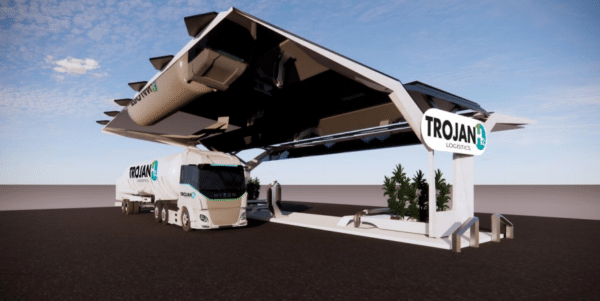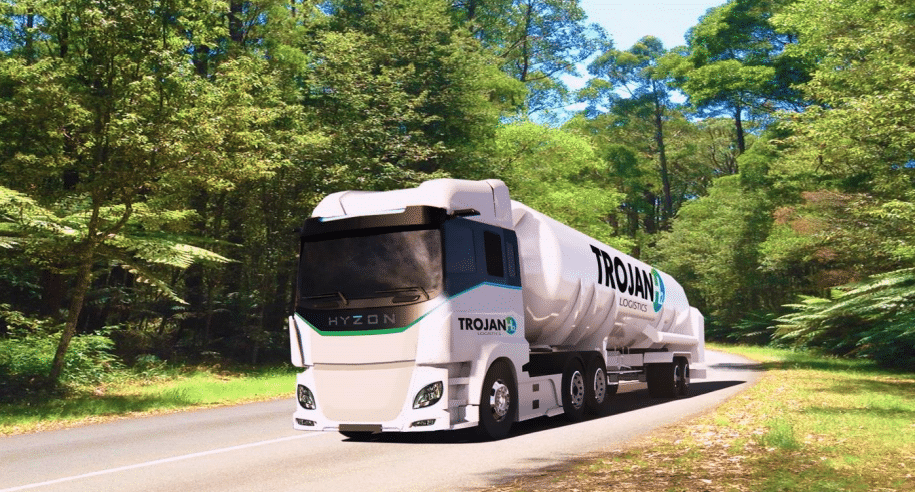As the thirst for hydrogen grows, companies are beginning to stake claim to downstream services. Today, Trojan H2 Logistics, which has team members in both Sydney and Melbourne, announced two separate agreements it hopes will position it as the forefront of green hydrogen transport business in Australia.
The company is working to create a carbon-free logistical transport chain along Australia’s east coast. To do this, it is introducing Fuel Cell Electric Trucks to transport Australian project’s soon-to-be renewably produced hydrogen. These movers will be supported by a series of refuelling and storage stations along major transit routes.
Turning this from vision to reality, Trojan has signed a memorandum of understanding (MoU) for the delivery of 100 LH2 Fuel Stations as well as a $US2.8 million (AU$3.6 million) agreement to immediately acquire two liquid hydrogen trailers capable of holding around 55,000 litres, or nearly four tonnes.
Trojan H2 Logistics said it views this as the beginning of a planned 1,000 fleet of H2 trucks Australia wide.
Trojan has also signed a second MoU with a industry leading supplier for the supply of 50 hydrogen prime movers, with a plan to purchase another 1,000 trucks if demand remains.
The company’s press release does not name the partnering companies for either of the MoUs, although the companies website says it has agreements in place with both Chart Industries and Hyzon Motors.
Chart Industries lists itself as having expertise in hydrogen fuelling stations and storage. It also provides transport trailers, and is presumably the company which will provide Trojan with its refuelling stations and initial trucks. Hyzon Motors, on the other hand, produce 50 tonne trucks with power density fuel cells, which Trojan mentions in its release.

Zero-carbon supply chains have proven central in discussions around green hydrogen transport, according to peak body, the Smart Energy Council. If Trojan can manage to pull off its green supply chain, it could provide for industry desires that Australian governments are less keenly focussed on.
Last week, Australia’s federal government committed a further $275.5 million to develop four new regional hydrogen hubs in Australia. The funding follows a windfall of similar announcements made this year by state governments, which are eager to set themselves up as major hydrogen export hubs.
“With the acceleration in the establishment of hydrogen hubs around Australia comes the need for a secure, reliable and affordable logistics solution to transport hydrogen,” Trojan said.
It hopes to be the one to provide this “yet unmet need,” noting that global consulting firm PwC expects the total domestic infrastructure investment required to store, transport and distribute hydrogen to take full advantage of Australia’s opportunity to become the dominant East Asian exporter could reach $80 billion by 2030.
Domestically, hydrogen is expected to be transported by pipelines – either newly built or modified existing pipelines – or via storage and transport of hydrogen in the form of gas, liquid or fuel cells. Which is presumably where Trojan hopes to come in.
In terms of export, companies like West-Australia GEV are vying for the international transport market. It is well underway with its plans to build a compressed hydrogen cargo ship to transport the future-fuel produced in West-Australia, the Northern Territory and Queensland projects.
This content is protected by copyright and may not be reused. If you want to cooperate with us and would like to reuse some of our content, please contact: editors@pv-magazine.com.









By submitting this form you agree to pv magazine using your data for the purposes of publishing your comment.
Your personal data will only be disclosed or otherwise transmitted to third parties for the purposes of spam filtering or if this is necessary for technical maintenance of the website. Any other transfer to third parties will not take place unless this is justified on the basis of applicable data protection regulations or if pv magazine is legally obliged to do so.
You may revoke this consent at any time with effect for the future, in which case your personal data will be deleted immediately. Otherwise, your data will be deleted if pv magazine has processed your request or the purpose of data storage is fulfilled.
Further information on data privacy can be found in our Data Protection Policy.